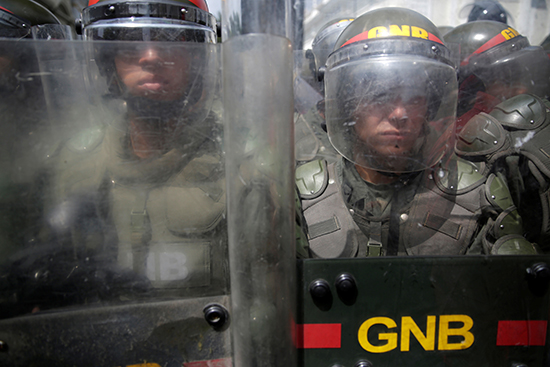Journalists covering Venezuela tension face violence, obstruction
| Publisher | Committee to Protect Journalists |
| Publication Date | 27 October 2016 |
| Cite as | Committee to Protect Journalists, Journalists covering Venezuela tension face violence, obstruction, 27 October 2016, available at: https://www.refworld.org/docid/58468751c.html [accessed 6 June 2023] |
| Disclaimer | This is not a UNHCR publication. UNHCR is not responsible for, nor does it necessarily endorse, its content. Any views expressed are solely those of the author or publisher and do not necessarily reflect those of UNHCR, the United Nations or its Member States. |
Bogotá, Colombia, October 27, 2016 – Journalists trying to cover rising political tensions in Venezuela have been obstructed and have come under attack, including by Venezuelan security forces and immigration officials, according to press freedom groups and news reports.
 Venezuelan security forces in riot gear stand in front of the National Assembly in Caracas, October 27, 2016. (Reuters/Marco Bello)
Venezuelan security forces in riot gear stand in front of the National Assembly in Caracas, October 27, 2016. (Reuters/Marco Bello)
Many of the attacks occurred yesterday during nationwide marches in which protesters demanded that the socialist government allow a recall election that could remove President Nicolás Maduro from office.
"The deepening political crisis in Venezuela is an issue of national and international interest, and as such journalists should be able to cover the story with government protection, not with harassment and interference by the government or any other group," Carlos Lauría, CPJ's senior program coordinator for the Americas, said from New York. "We urge local authorities to stop disrupting the work of the media and to ensure that all journalists can report freely, without fear of reprisal."
In the western city of Mérida, Emmanuel Rivas, correspondent for the news website El Pitazo, was hit in the face, back and knee by birdshot fired by riot police, Espacio Público, a Venezuelan free expression organization, said in a press release. It said Rivas was treated at a clinic and released.
Nairobys Rodríguez, El Pitazo's correspondent in Sucre state, was hit on the head with a rock as police and government supporters attacked protesters, according to a report in El Pitazo.
Masked men hit Rubenis González, a journalist for the news website Versión Final in the western state of Zulia, on the head with a rock, according to the Caracas-based press freedom group, the Institute for Press and Society (IPYS). The men also damaged Versión Final's press vehicle, the organization said.
During the protests on Margarita Island, off Venezuela's Caribbean coast, security forces beat and briefly detained radio reporter Rosa Reyes as she interviewed protesters, according to Espacio Público. Police also briefly detained Anderson Herrera, a photographer for the newspaper El Oriental de Monagas in Maturín state, and forced him to erase his photographs of the protests, Espacio Público reported.
Several foreign correspondents were unable to cover the protests. Security forces on October 24 detained Matt Gutman, a correspondent for the U.S. television channel ABC News, while he reported on deteriorating conditions at a hospital in the central city of Valencia, according to news reports. He was released yesterday. "Matt was detained while in Venezuela to report for ABC News. He was released without incident," ABC News confirmed in a statement this morning.
On Tuesday, four Peruvian journalists were stopped at Caracas' international airport and denied entry to Venezuela, according to news reports. Peruvian journalists Ricardo Burgos, Leónidas Chávez, and Armando Muñoz, who were working for the Mexican TV station Televisa, and photographer Ricardo Venegas were told by immigration officials that they lacked the proper permits to enter the country and denied entry, Peru's ambassador to Venezuela, Mario López Chávarri, said in a statement.
Since 2012, foreign correspondents have been instructed to apply for press credentials with the Communications Ministry before traveling to Venezuela. However, many reporters complain that their requests for credentials go unanswered.
On August 31, six international correspondents, including CPJ's Andes correspondent, were denied entry to Venezuela on the grounds that they lacked press credentials, CPJ reported at the time.
CPJ research shows that authorities have used a variety of tactics to restrict independent media under Maduro's government. Online and radio journalist Braulio Jatar Alonso was arrested in early September and is still imprisoned, accused of money laundering after covering a protest. The arrest and the latest incidents came amid a crackdown on political opponents, as the Maduro government confronts growing unrest over widespread food shortages and triple-digit inflation.
